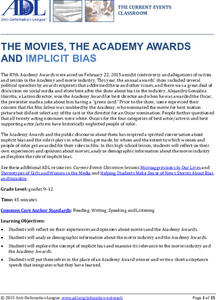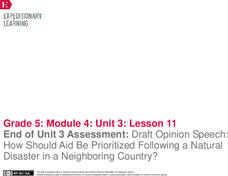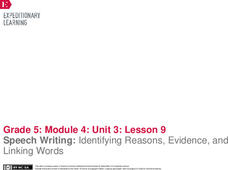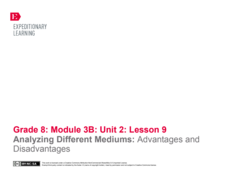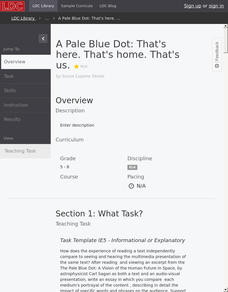Building Evidence-Based Arguments: Grade 9
New ReviewHigh schoolers investigate the dilemma of a proportional response with a lesson about the history of terrorism and militant extremists in the United States. As they examine memos from the FBI and speeches from President Bush and Obama,...
Carolina K-12
Minnesota v. White: Exploring a Judicial Candidate’s First Amendment Rights
After watching a documentary on the Supreme Court case Republican Party of Minnesota v. White, class members research how the First Amendment and free speech issues influence judicial elections and then conduct a mock judicial election.
Anti-Defamation League
The Movies, the Academy Awards and Implicit Bias
"And the award goes to. . . " High schoolers investigate bias in the movie industry by reading articles, watching a short video, and examining data about the Academy of Motion Picture Arts and Sciences (AMPAS) membership, nominees, and...
C3 Teachers
Uncle Tom’s Cabin: Can Words Lead to War?
"Words, words, words." Despite Hamlet's opinion, words can be significant. In this inquiry lesson, middle schoolers learn how the words in Harriet Beecher Stowe's Uncle Tom's Cabin, in the view of many, lead to the American Civil War. To...
K20 LEARN
Speak Up! Four Categories Of Speeches
High schoolers examine the four major types of speeches: informative, demonstrative, persuasive, and extemporaneous. Groups then select one type and craft and share a presentation highlighting this format's characteristics. Finally,...
Franklin D. Roosevelt Presidential Library & Museum
Pearl Harbor Activity #1: Newspaper or Radio Account
After listening to President Franklin D. Roosevelt's "Day of Infamy" speech, young historians research information about the Japanese attack on Pearl Harbor, possible motives for the attack, and the consequences of the attack. Scholars...
EngageNY
Final Performance Task: Critique and Revision, Part II
Stop ... grammar time! Pupils complete worksheets to practice using the correct verb tense and identify correlative conjunctions. Next, scholars apply their new grammar skills to edit their draft opinion speeches.
EngageNY
End of Unit 3 Assessment: Draft Opinion Speech: How Should Aid Be Prioritized Following a Natural Disaster in a Neighboring Country?
Put it to the test. With the cumulative resource, pupils complete the End of Unit 3 Assessment. Using everything they've learned in the unit, they write a draft of an opinion speech about how to prioritize aid after a natural disaster.
EngageNY
Speech Writing: Identifying Criteria for a High Quality Conclusion
Learning is never-ending. Scholars learn about effective conclusions as they continue watching a video of an opinion speech. After analyzing the speech's conclusion, they work in small groups to write an ending for their own speeches.
EngageNY
Speech Writing: Identifying Reasons, Evidence, and Linking Words
Enjoy the view. Scholars continue viewing a video of an opinion speech, this time identifying the supporting evidence the speaker employs. After watching, they work in small groups on their shared writing projects, crafting a body...
EngageNY
Speech Writing: Identifying Criteria for a High-Quality Introduction
Using a helpful resource, pupils watch a TED Talk of an opinion speech as they consider the criteria for a high-quality introduction. Scholars then engage in a shared writing process with the teacher to practice writing the introduction...
EngageNY
Mid-Unit 3 Assessment, Part II: Organizing Notes for a Public Speech
It's all a matter of opinion! Pupils take Part II of the mid-unit assessment, in which they continue organizing their notes in preparation for writing an opinion speech. Using the resource, they add reasons, evidence, and a concluding...
EngageNY
Mid-Unit 3 Assessment, Part I: Short Constructed Response and Organizing Notes for a Public Speech
It's time to put pen to paper. Scholars complete the first part of the mid-unit 3 assessment, writing a short constructed response about international aid following a natural disaster. Next, pupils use informational texts and note...
Nemours KidsHealth
STDs: Grades 9-12
After gathering information about Sexually Transmitted Diseases (STDs), high schoolers engage in two activities designed to educate themselves and others. They begin by using what they have learned to write a speech for a friend who...
EngageNY
Resource Materials and Gathering Information: Reading Another “Choice” Text from the Research Folder
Look it up. Scholars use a dictionary and thesaurus to verify the meaning of the research vocabulary words they defined in the previous activity. They then use sticky notes to write a synonym for each word. Finally, individuals choose a...
University of Minnesota
Writing for Success
You can be a success! Scholars learn skills required for successful writing with a step-by-step process. They begin with the basics of parts of speech, such as indefinite pronouns, and writing a simple sentence. Individuals then build...
EngageNY
End of Unit Assessment: Presentation of Position
What is the difference between formal and informal language? Pupils rewrite their position speeches to adapt them for an audience of adults. Next, they present their speeches in small groups, attempting to answer the question, "Which...
EngageNY
Analyzing Different Mediums: Advantages and Disadvantages
How do authors play to people's moods? After briefly reviewing mood using a Conditional and Subjunctive Mood handout, learners practice identifying conditional and subjunctive sentences in the Montgomery Bus Boycott speech before reading...
American Battlefield Trust
1861: The Country Goes to War
What was it like to know the Civil War was coming? Using a graphic timeline activity and excerpts of speeches from Abraham Lincoln and Jefferson Davis, learners consider the early days of the conflict. The resource includes prompts for...
Literacy Design Collaborative
A Pale Blue Dot: That's Here. That's Home. That's Us.
21st-century learners live in such a visual world that many are unused to letting their minds imagine the picture that words create. An excerpt from Carl Sagan's lecture, "The Pale Blue Dot: A Vision of the Human Future in Space,"...
Reed Novel Studies
The Year of Billy Miller: Novel Study
Can you really knock the sense into someone? It seems that the bump on Billy's head changed his perspective on things in The Year of Billy Miller. Readers discover that after his injury, Billy appreciates his parents more and is nicer to...
Reed Novel Studies
Wonder: Novel Study
Beauty is more than skin deep. Auggie, the main character in Wonder, has a facial defect, but his inner beauty shines. Taking a cue from Auggie, scholars learn how a person is more than outer appearance. To finish the resource, they...
Reed Novel Studies
The True Blue Scouts of Sugar Man Swamp: Novel Study
Wild feral hogs and an alligator wrestler are just two interesting aspects of Kathi Appelt's novel The True Blue Scouts of Sugar Man Swamp. Using the novel study, scholars search the text for examples of the eight parts of speech....
Reed Novel Studies
Superfudge: Novel Study
Has everyone heard the news about the herd of antelope? Scholars explore homonyms with the novel study for Superfudge by beloved children's author Judy Blume. Additionally, they answer text questions and engage in language activities....




